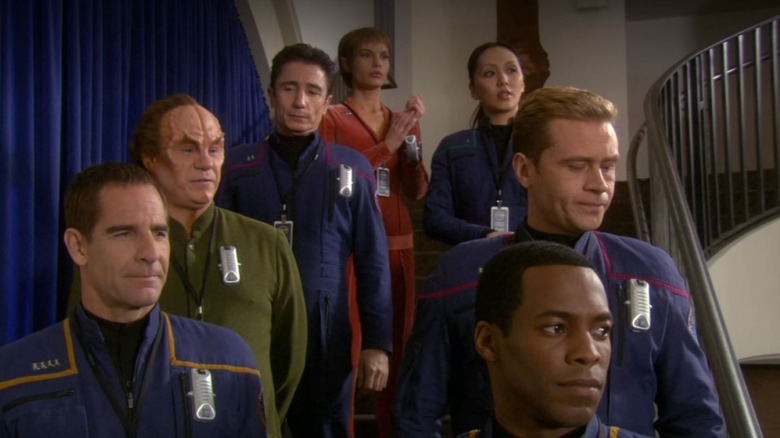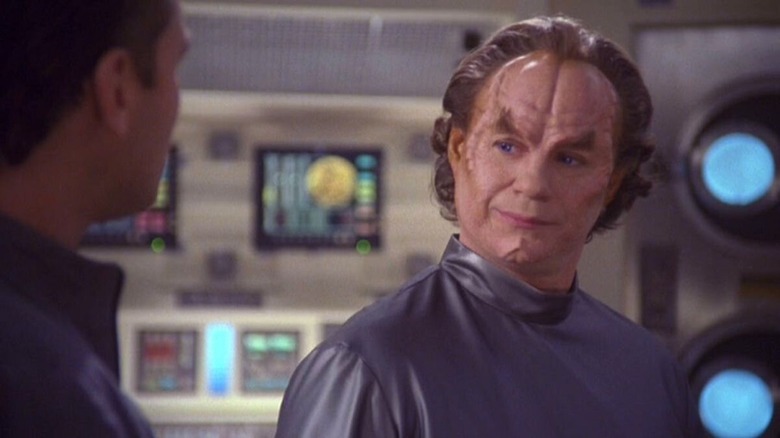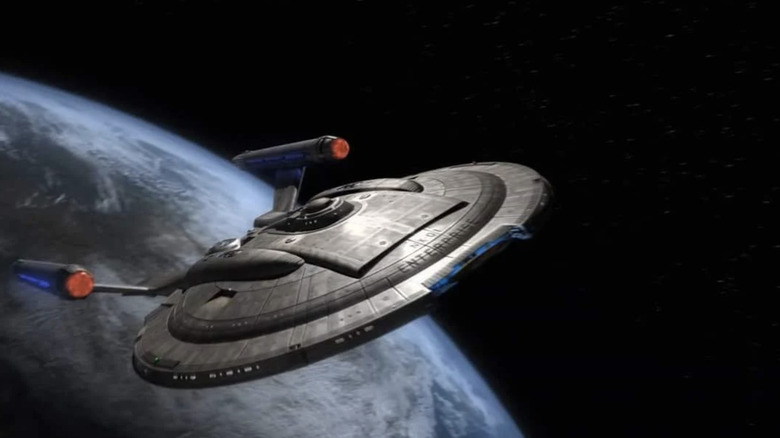Star Trek: Enterprise Was Under An 'Edict': No Cast Member Could Also Direct
"Star Trek" ensembles often wind up serving double duty as the series' pool for episode directors. It started with the movies — Leonard Nimoy directed 1984's "Star Trek III: The Search for Spock" and 1986's "Star Trek IV: The Voyage Home," with the former stemming from fan fiction. William Shatner directed 1989's "Star Trek V: The Final Frontier" — unfortunately, he wasn't as skilled in the director's chair as Kirk was in the Captain's.
While none of the original cast directed any of the 79 classic "Star Trek: The Original Series" episodes, that changed during the "Next Generation" era from '87–'94. (For many, it's "Star Trek" on TV at its best.) Jonathan Frakes was the first of them. Beginning with the season 3 episode, "The Offspring," Frakes directed eight "Next Generation" episodes and the 1996 and 1998 films "First Contact" and "Insurrection," respectively. It'd take far too long to list every cast member who directed every episode, but prolific ones include LeVar Burton (Geordi LaForge), Roxann Dawson (B'Elanna Torres on "Voyager"), and René Auberjonois (Odo on "Deep Space Nine").
Despite the commonality of "Star Trek" actors directing episodes from "Voyager" to "The Next Generation," the prequel series "Star Trek: Enterprise" — which ran from 2001 to 2005 — reversed course and explicitly barred its main cast from directing any episodes.
The door wasn't open
John Billingsley, who played Doctor Phlox — one of the best "Star Trek" characters — spoke with TrekMovie.com last month about his experiences acting on "Enterprise," why it struggled, and how the show holds up today. Billingsley revealed the "edict" that he and his cast mates weren't allowed to direct. He attributes this to a risk-averse attitude at UPN, the home network of "Enterprise."
"I don't think that was a reflection on our particular cast. I just think by the time our show was on UPN, a dying network, the ratings were in the toilet. The word from on high was, 'You don't have the latitude that we might have given you back when we felt the franchise was really healthy.' So to a certain extent — and I don't want this to sound snotty, because ['Enterprise' creators] Rick [Berman] and Brannon [Braga] were nothing but gracious to me — but I didn't ever get the impression that it was like, 'Swing the door open and come on in, let's hear [your pitches].'"
Indeed, UPN would be shuttered in September 2006, a little over a year after "Enterprise" wrapped its four-season run. Billingsley isn't the first to voice this frustration — Scott Bakula, who played Captain Jonathan Archer, also felt the show was hampered by being at a dying network. Following its cancellation in 2005, "Star Trek" went off TV for 12 years, until the launch of "Discovery" in 2017.
Playing it safe
Not only was "Enterprise" cut short, but the network's risk-averse attitude harmed the show's quality. It took until season 3 before it was allowed to experiment instead of retelling same-old, same-old "Star Trek" concepts. The series finale, "These Are The Voyages," became a piece of "Next Generation" nostalgia. Instead of the series concluding its run on its own terms, Will Riker (Jonathan Frakes) and Counselor Deanna Troi (Marina Sirtis) — from "The Next Generation" — view the last mission of the "Enterprise" crew via Holodeck.
For what it's worth, "Enterprise" did feature a bunch of "Trek" alums as directors. LeVar Burton and Roxann Dawson both directed 10 episodes each, while Robert Duncan McNeill — who played Tom Paris on "Voyager" — directed four. These three had proven their directing bona-fides on past "Trek" shows and might have been considered less of a risk by UPN. But none of the "Enterprise" cast was deemed a safe bet. Not even Scott Bakula, who had helmed three "Quantum Leap" episodes. And hence, not a single one of the 98 "Enterprise" episodes were directed by its main cast.
I don't think this "no actors directing" edict is what caused the premature demise of "Enterprise," but it's symptomatic of a playing-it-safe approach that hindered the show.


